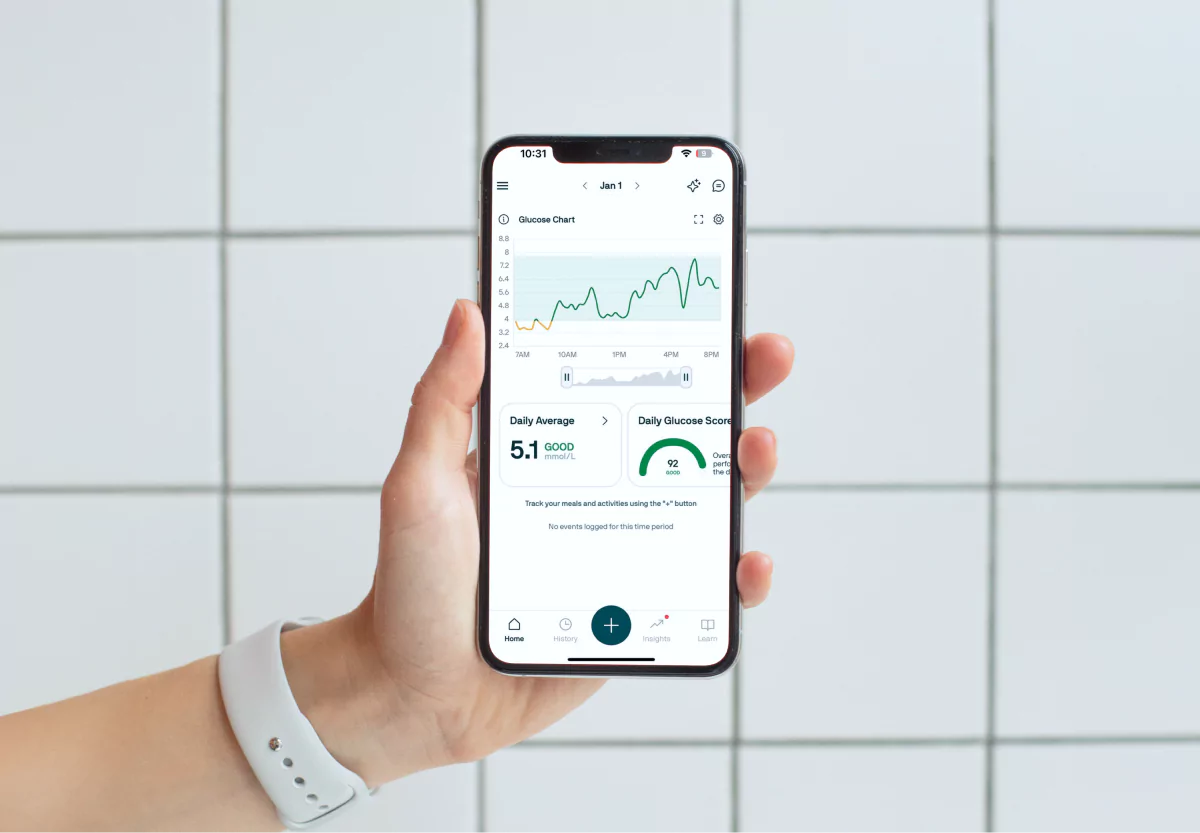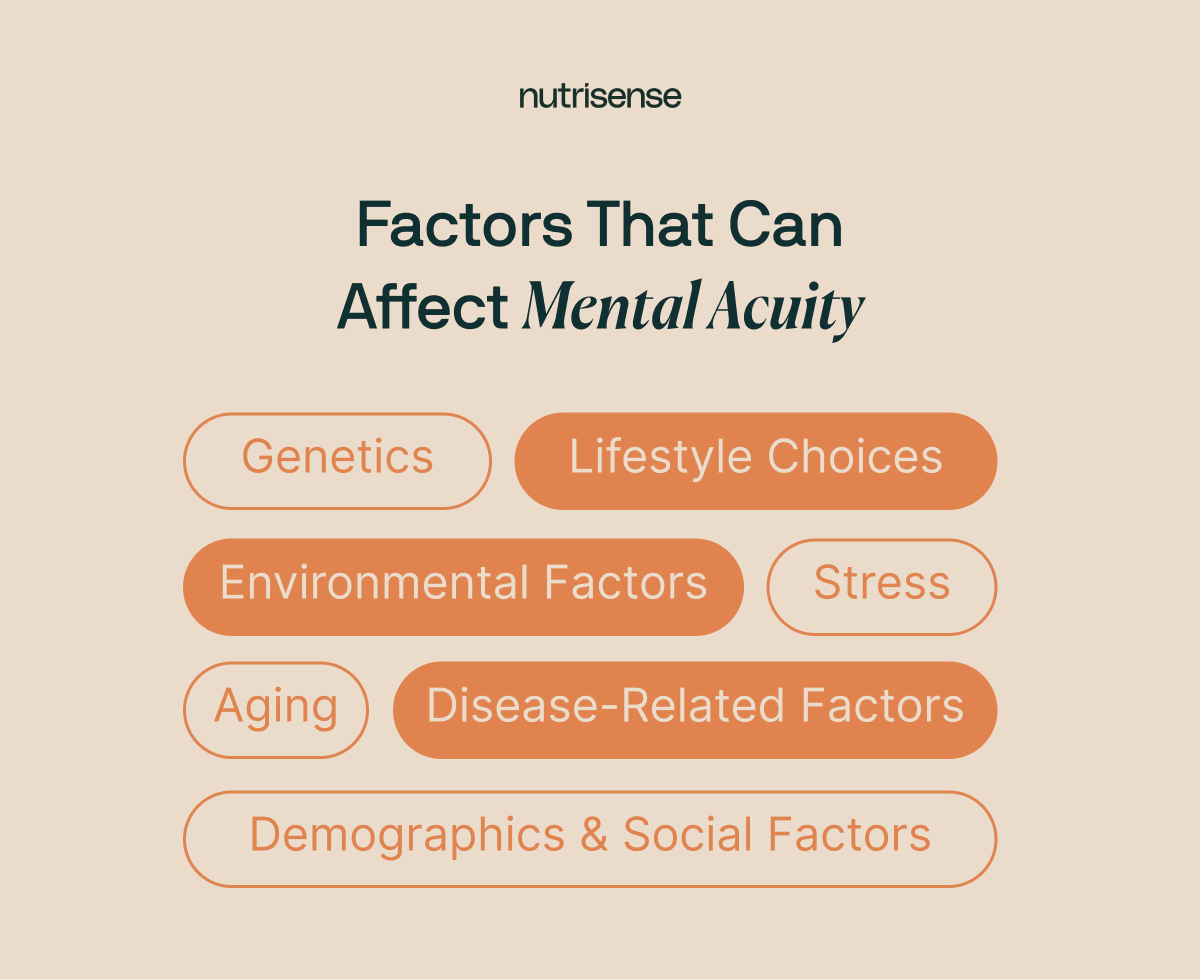Exploring the Connection Between Mental Acuity and Glucose

Key Takeaways
Mental acuity, your ability to focus and recall information, relies on stable glucose as its primary fuel. Frequent fluctuations can lead to brain fog and slower thinking, while balanced glucose levels support sustained cognitive performance and brain health.
Key Points:
- Your brain is highly active and uses a significant share of the body’s glucose for energy, making stable levels important for cognitive tasks.
- Begin tracking your glucose to see how specific foods and habits affect your personal focus and energy levels throughout the day.
- The Nutrisense program includes complimentary access to a dietitian for your first month, and video calls are often covered by insurance.
What to Know About Mental Acuity and Glucose
Can’t remember where you put your keys? If you turned off the oven? Locked the door on your way out? A decrease in your mental acuity could be the cause of this.
Mental acuity is the ability to focus, learn, and recall information. It is often associated with cognitive skills and mental sharpness that enable effective functioning in various intellectual tasks.
In order to have optimal mental acuity, your brain needs to have the fuel required to function properly. Glucose is the energy source for our brain - the gasoline for your thinking machine.
So what happens if your brain has an inappropriate amount of glucose to function? How does this impact your mental acuity and cognitive performance over time? Let’s find out!
What is Mental Acuity?

Acuity is the ability to see, hear, and think accurately and clearly. Mental acuity, in turn, refers to the ability to process information, memory, pay attention, and make appropriate decisions based on the information provided.
A person with high mental acuity is likely to have quick and clear thinking, a strong ability to focus, and good cognitive performance. A person with suboptimal or low mental acuity may struggle with focus and perform poorly on tasks.
Factors that can contribute to impact mental acuity include:
- Genetics
- Diet and lifestyle habits
- Disease-related factors
- Demographic and social factors
- Environmental factors
Your brain is responsible for several important aspects of living, and it works as the control center for your heartbeat and breathing. It’s also responsible for things like reasoning, memory, judgment, focus, and attentiveness.
Why is Mental Acuity Important?

Mental acuity impacts your cognition, ability to learn, ability to complete tasks, and more.
Improved Productivity and Performance
Enhanced mental acuity, or having a sharper mind, can allow for quick decision-making and analytical thinking. It can allow you to focus on your daily tasks, have a better memory, and be more productive.
Reduced Risk of Cognitive Decline
You can keep your mental acuity sharp by keeping your brain active - and this becomes especially important for older adults. Continual learning and mental challenges promote the formation of new neural connections, which may help support healthy cognitive aging and maintain your brain plasticity.
A study in 2023 found that people who regularly participated in mental acuity tasks were nine to 11 percent less likely to develop dementia. Physical exercise is another way to prevent a decline in mental acuity and cognition.
Independence And Quality Of Life
A sharp mind is essential for being able to function independently. From little things, such as tying your shoes, to bigger tasks, such as driving a car and managing your finances, all require optimum mental acuity. Supporting your brain as you age is critical for independent living.
What is the Relationship Between Glucose and the Brain?

Glucose is the main energy source for every cell in your body, but it is vital for brain cells. Your brain is made up of nerve cells (neurons) that rely on a continuous supply of glucose in order to send signals or messages to other nerve cells and other parts of the body.
The brain is highly metabolically active, meaning that it requires a lot of fuel, and a significant portion of the body's glucose is utilized by the brain to support its various functions.
How are Glucose and Mental Acuity Connected?
Maintaining stable glucose in your brain is essential for cognitive functioning. When glucose levels are adequate, the brain can efficiently carry out cognitive functions such as critical thinking and problem-solving. But what happens to your mental acuity when your glucose levels frequently fluctuate into abnormal ranges?
The Afternoon Brain Fog Moment We’re All Familir With
You’re in a 2 p.m. video call, trying to explain a key project update, but your focus is gone. You find yourself re-reading the same line in your notes, unable to process it. That familiar, frustrating brain fog descends, making it impossible to think clearly, and you start to wonder if the ‘healthy’ wrap you had for lunch is the real reason you can't get your thoughts straight.
Fluctuations in glucose levels, such as hypoglycemia (low glucose) or hyperglycemia (high glucose), can negatively impact cognitive function, attention, and memory. Low glucose in the bloodstream, for example, can lead to cognitive impairment and even neurological symptoms like slurred speech, confusion, and blurred vision.
At the same time, research indicates that type 2 diabetes mellitus is linked with memory impairments, neurodegeneration (a gradual loss of brain cells), and other types of cognitive dysfunction.
When it comes to mental acuity, it’s important to maintain a balanced diet, including carbohydrates that provide a steady supply of glucose, to support cognitive function and overall brain health.
Neurotransmitter Function
The neurons in your brain are constantly active; therefore, your brain needs a constant supply of glucose - even while sleeping. Once the glucose is in the brain, it is converted into a neurotransmitter called adenosine triphosphate (ATP).
ATP is needed for learning, thinking, and memory. If there isn’t enough glucose to feed the brain, or if there are dips in the glucose levels in the brain, ATP levels drop, and brain function may be impacted.
Glucose Fluctuations

As we mentioned earlier, high glycemic variability can have negative effects on your mental acuity or cognitive performance. For example, when your glucose is too high, you may experience headaches or feel hyper. When the glucose is too low, you may experience symptoms such as feeling foggy, lightheaded, or even have trouble walking.
Emergency Mental Acuity Changes - DKA and HHS Warning Signs
A sudden drop in mental clarity with nausea, vomiting, extreme thirst, or marked drowsiness can signal a hyperglycemic emergency such as diabetic ketoacidosis (DKA) or hyperosmolar hyperglycemic state (HHS). These conditions need urgent medical attention. For diagnostic details and care guidance, see the ADA and EASD consensus statement on hyperglycemic crises.
- DKA red flags include nausea or vomiting, abdominal pain, deep or rapid breathing, fruity-smelling breath, dehydration, fatigue, and confusion.
- HHS red flags include very high readings, often 600 mg/dL or higher, extreme thirst and dry mouth, frequent urination, severe dehydration, drowsiness, or confusion.
- Check ketones during illness or when very high readings persist, and seek urgent care if ketones are positive or if symptoms above appear.
- If you use a continuous glucose monitor, remember it reports glucose measured in interstitial fluid. Follow your clinician’s advice if symptoms are concerning or do not match your readings.
Do Prediabetes and Type 2 Diabetes Affect Brain Health?
Over time, this impaired glucose metabolism can result in cognitive dysfunction and can be a risk factor for glucose intolerance and prediabetes.
What Other Factors Affect Mental Acuity?

There are other personal issues and lifestyle choices that can impact your mental acuity. Some of these issues can be changed, but some cannot.
Aging
Aging can impact cognition. This can be mild, such as forgetting where you put your keys, or, in cases of Alzheimer’s disease, it can be severe. Memory and processing information may become more challenging as you age. However, living a healthy lifestyle can decrease the rate of cognitive decline as we age.
Stress
Everyone experiences different types of stress at some point in their lives, and we all process it differently. Mild stress can actually enhance cognition - there have been several studies showing that mild stress among college students improves their educational performance.
However, chronic stress, which is a prolonged or consistent state of stress that can negatively impact your health, can also have a detrimental effect on cognition. A study found that chronic stress or perceived chronic stress leads to an increase in cognitive decline and poor memory.
Lifestyle Choices
Your dietary choices and lifestyle habits can contribute to worsening cognitive function and affect mental health. A sedentary lifestyle is a major contributor to poor cognition. Regular physical activity has numerous health benefits, including a better functioning brain.
How Can You Stabilize Glucose For Better Cognitive Function
There are a number of lifestyle improvements you can make that can support better cognition and mental acuity. The following tips can help you keep your glucose levels stabilized and within the normal ranges:
- Eating a balanced diet
- Limiting your intake of ultra-processed foods and added sugars
- Getting appropriate levels of exercise
- Staying hydrated
- Practicing mindful eating
- Prioritizing sleep
- Reducing high levels of stress
Eating a balanced diet that includes unprocessed foods, whole grains, a variety of fruits and vegetables, lean proteins, and healthy fats can help keep a steady stream of glucose available for your brain to convert to energy.
In addition to this, making other healthy lifestyle adjustments, such as exercising regularly, can help keep your glucose levels within the normal range. Effective stress management can also help keep glucose levels steady throughout the day.
By implementing these tips to support optimal glucose levels, you can proactively enhance your overall well-being and promote better cognitive performance.
Find the right Nutrisense programto turn insight into progress.
Go Beyond Glucose Data with Nutrisense
Your glucose can significantly impact how your body feels and functions. That’s why stable levels are an important factor in supporting overall wellbeing. But viewing glucose isn't enough. Nutrisense, you’ll be able to learn how to use your body's data to make informed lifestyle choices that support healthy living.
One-to-one coaching
Sign up to access insurance-covered video calls to work with a glucose expert: a personal registered dietitian or certified nutritionist who will help tailor your lifestyle and diet to your goals.
Monitor and measure what matters
With the Nutrisense CGM Program, you can monitor your glucose with health tech like glucose biosensors and continuous glucose monitor (CGM)s, and analyze the trends over time with the Nutrisense App. This will help you make the most informed choices about the foods you consume and their impact on your health.
Find your best fit
Ready to take the first step? Start with our quiz to find the right Nutrisense program to help you take control.
Go Beyond Glucose Data with Nutrisense
Your glucose can significantly impact how your body feels and functions. That’s why stable levels are an important factor in supporting overall wellbeing. But viewing glucose isn't enough. With Nutrisense, you’ll be able to learn how to use your body's data to make informed lifestyle choices that support healthy living.
Talk with a Glucose Expert
Sign up to access insurance-covered video calls with a glucose expert: a personal registered dietitian or certified nutritionist who will help tailor your lifestyle and diet to your goals.
24/7 glucose insights
With the Nutrisense Program, you can monitor your glucose with health tech like glucose biosensors and continuous glucose monitors (CGMs), and analyze the trends over time with the Nutrisense App. This will help you make the most informed choices about the foods you consume and their impact on your health.
Take the first step
Ready to take the first step? Start with our quiz to find the right Nutrisense program to help you take control.

Victoria began her career in the functional medicine space in 2015. She has extensive experience interpreting labs and supporting weight loss, gut imbalances, and chronic migraines. She received her Bachelor of Science degree in nutrition and dietetics from Missouri State University.


.webp)

